Engine Coolant Thermostat Replacement Gasoline Engine
Removal Procedure
- Drain the coolant until the radiator coolant level is below the
thermostat. Refer to
Cooling System Draining and Filling
.
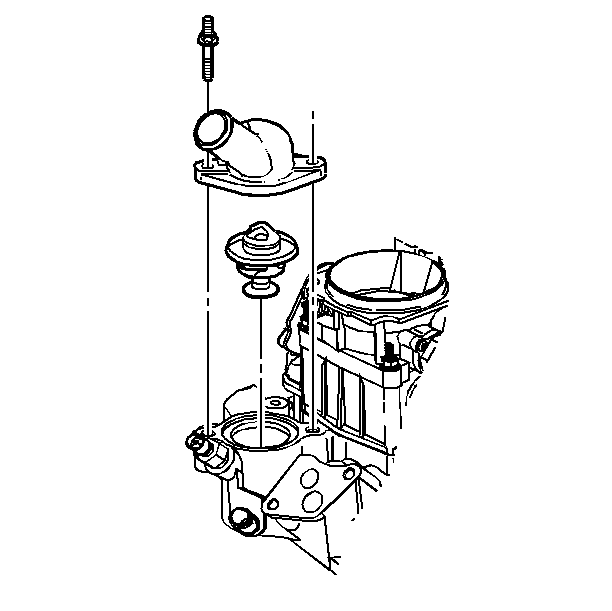
- On the 4.3L, remove the following items:
| 2.3. | The thermostat from the housing |
| 2.4. | The gasket (If necessary) |
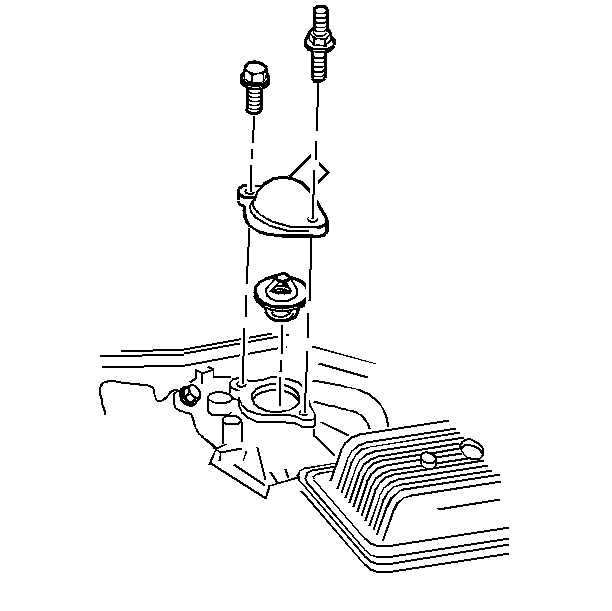
- On the 5.0L and the 5.7L, remove the following
items:
| 3.3. | The thermostat from the housing |
| 3.4. | The gasket (If necessary) |
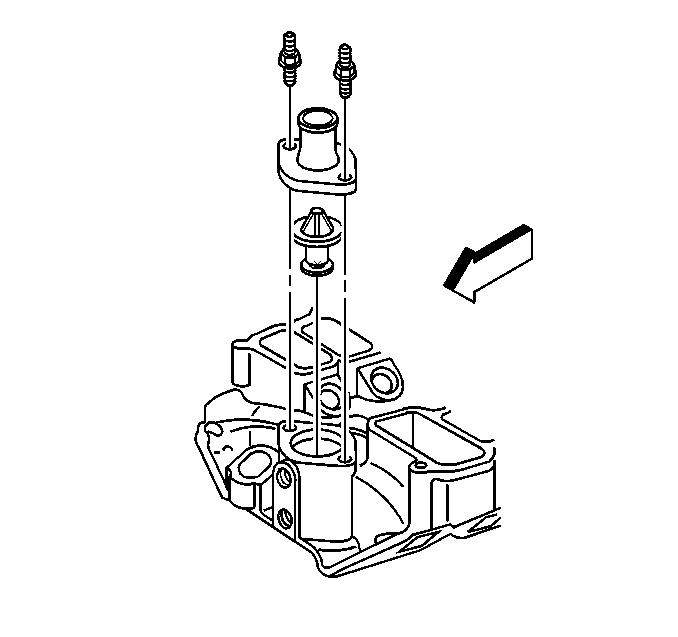
- On the 7.4L, remove the following items:
| 4.3. | The thermostat from the housing |
| 4.4. | The gasket (If necessary) |
- Clean the thermostat housing and the cooling outlet sealing surfaces.
Installation Procedure

- For the 4.3L, install the following items:
| 1.1. | The thermostat into the housing |
| 1.2. | The gasket (If necessary) |
- Install the bolts or the studs
Tighten
Tighten the bolts or the studs to 28 N·m (21 lb ft).
Notice: Use the correct fastener in the correct location. Replacement fasteners
must be the correct part number for that application. Fasteners requiring
replacement or fasteners requiring the use of thread locking compound or sealant
are identified in the service procedure. Do not use paints, lubricants, or
corrosion inhibitors on fasteners or fastener joint surfaces unless specified.
These coatings affect fastener torque and joint clamping force and may damage
the fastener. Use the correct tightening sequence and specifications when
installing fasteners in order to avoid damage to parts and systems.

- For the 5.0L and the 5.7L, install the
following items:
| 3.1. | The thermostat into the housing |
| 3.2. | The gasket (If necessary) |
- Install the bolts or the studs
Tighten
Tighten the bolts or the studs to 28 N·m (21 lb ft).

- For the 7.4L, install the following items:
| 5.1. | The thermostat into the housing |
| 5.2. | The gasket (If necessary) |
- Install the bolts or the studs
Tighten
Tighten the studs to 37 N·m (27 lb ft).
- Refill the coolant to the cooling system. Refer to
Cooling System Draining and Filling
.
- Start the engine. Run the engine, with the radiator cap removed,
until the radiator upper hose becomes hot (This indicates that the thermostat
is open).
- With the engine idling, add the coolant to the radiator until
the coolant level reaches the bottom of the filler neck.
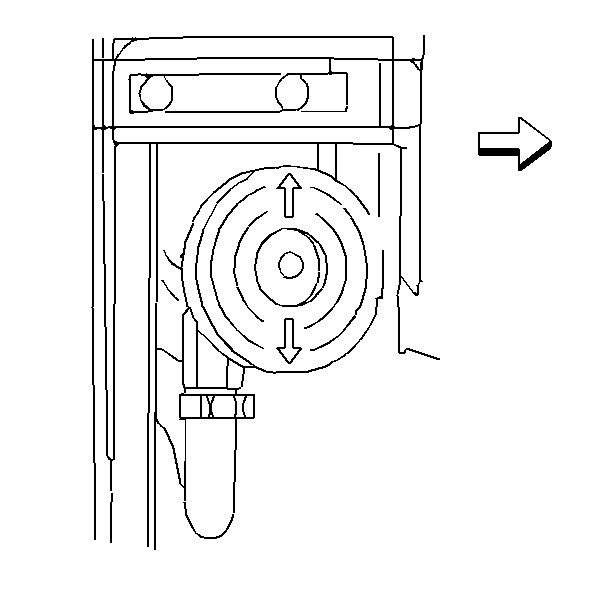
- Install the radiator cap to the radiator.
Make sure that the cap arrows (1) line up with the overflow tube.
- Inspect the cooling system for leaks.
Engine Coolant Thermostat Replacement Diesel Engine
Removal Procedure
- Drain the coolant until the radiator coolant level is below the
thermostat. Refer to
Cooling System Draining and Filling
.
- Disconnect the radiator inlet hose.
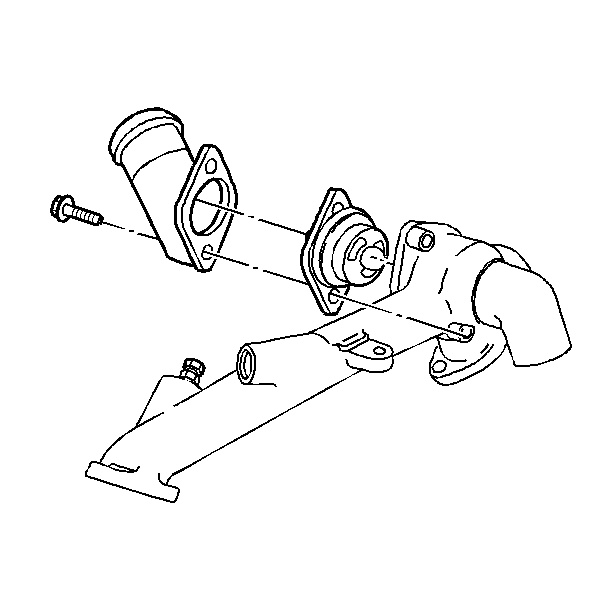
- Remove the bolt, the stud and the coolant
outlet.
- Remove the gasket.
- Remove the thermostat from the housing.
- Clean the sealing surfaces of the thermostat housing and the coolant
outlet.
Installation Procedure

- Install the thermostat into the housing.
- Install the gasket into position.
- Install the coolant outlet.
- Install the bolt and the stud.
Tighten
Tighten the bolt and the stud to 42 N·m (31 lb ft).
Notice: Use the correct fastener in the correct location. Replacement fasteners
must be the correct part number for that application. Fasteners requiring
replacement or fasteners requiring the use of thread locking compound or sealant
are identified in the service procedure. Do not use paints, lubricants, or
corrosion inhibitors on fasteners or fastener joint surfaces unless specified.
These coatings affect fastener torque and joint clamping force and may damage
the fastener. Use the correct tightening sequence and specifications when
installing fasteners in order to avoid damage to parts and systems.
- Connect the radiator inlet hose.
- Refill the coolant into the cooling system. Refer to
Cooling System Draining and Filling
.
- Start the engine. Run the engine, with the radiator cap removed,
until the upper radiator hose becomes hot (This indicates that the thermostat
is open).
- With the engine idling, add coolant to the radiator until the
coolant level reaches the bottom of the filler neck.

- Install the radiator cap to the radiator. Make sure that the arrows
line up with the overflow tube.
- Inspect the cooling system for leaks.










